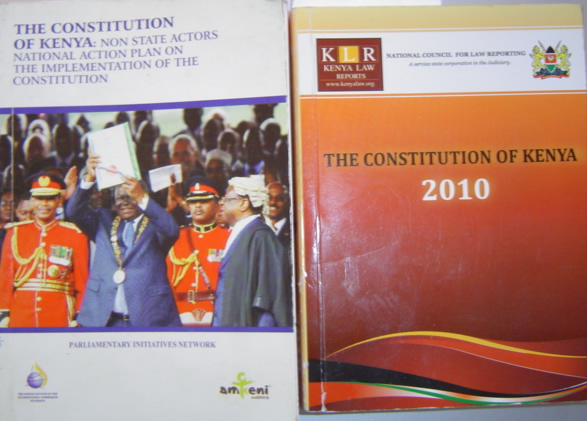15 Reasons to Vote No to the new Zimbabwe Constitution
Friday, February 15th, 2013 by Bev ClarkJust in from the International Socialist Organisation (ISO):
COPAC Draft Constitution
Vote No to this elitist Peace Charter and Politicians Gravy Train. Vanorovambwa vakaviga mupinyu
15 Reasons to Vote No!
1. It was not written by you the people but by four leaders of the GNU political parties.
2. It’s not democratic! 33 Years rule by one man is enough. It allows President Mugabe, 89, possibly to rule for another 10 years, when he will be 99! Zvanyanya… He must retire. Even the Pope has, at 85.
3. It does not provide funded and time-defined rights to: jobs, education, health, housing, water, food, electricity, public transport, rural development; disability; social security and empowerment. It does not provide basic rights but only progressive rights which are subject to claw-backs and availability of funds to the State but there are no provisions to enable the State to fund the declared rights.
4. It’s not democratic! It retains the imperial executive president: “President wemasimba ose.” President appoints all cabinet ministers and most senior state, military and judicial officials; can unilaterally change laws, dissolve parliament or declare war. Provides no age limit. Allows current judges and AG Tomana to stay in office without vetting. No real Devolution of power is provided for.
5. It does not guarantee free and fair elections! The same June 2008 generals and judges will control the election process! No right to vote for the Diaspora. No right to recall corrupt or ineffective councilors or MPs; No proportional representation of MPs; No quotas for workers, farmers, youths or war vets.
6. Is a politicians’ gravy train: has over 350 MPs, 2 vice presidents and an unlimited cabinet! It abolishes death penalty mainly for men over 70 years …who are these and why them alone? Abolish the Death Penalty for all! In 2011 it was the Zim 45 facing the death penalty for treason charges of watching the Egypt video, today it’s the GV 29 political prisoners…Free Maengahama and Ors… Drop the charges!
7. No compensation for victims of past genocides, Gukurahundi, state violence like June 2008 and Murambatsvina. No transitional justice and punishment for perpetrators of crimes against humanity.
8. Attacks workers: no living wage; no full right to strike; denies full collective bargaining for civil servants; prohibits civil servants and municipal workers from political activity; no protection of contract workers; no time limits for finalizing labour disputes; no exclusive Labour Court.
9. Attacks youths and students: No right to jobs, public work programmes or economic empowerment; no right to education, grants or loans; no youths quotas in parliament/councils; no right to abortion.
10. Attacks women: no 50-50% quotas in jobs or all public offices; no economic empowerment; no social grants and social security right; no funded maternity pay/benefits for all women; no right to abortion.
11. Attacks vendors and informal sector: no right to trade or work without harassment; no economic empowerment; no social security benefits. Attacks and scapegoats minorities like gays and lesbians.
12. Does not give land to the landless or for housing or compensation to ex-farm workers but specially protects the chefs with many farms; and compensates ex-white and foreign western farmers.
13. Is preparation for another elite GNU after elections, bringing together Zanu PF and MDC politicians, bosses and imperialists to make money and accelerate their policies of capitalism, ESAP and neo-liberalism against workers, youths, women, farmers and the poor ["Eat what you hunt"].
14. It totally defends the capitalist system and property of employers and the rich. No nationalization under workers’ and communities’ control of natural resources like diamonds, platinum, gold and major businesses to fund jobs, education, health, water, rural farmers etc. No empowerment or employee or community ownership schemes! It’s a constitution for politicians, employers and the rich: the 1% of plutocrats or elites, and not us the 99%, the ordinary people!
15. No more half-backed promises of change or the crumbs COPAC is offering just because of elections. Politicians lie to get into power but once in office they forget the people and start looting. The COPAC Constitution will cost over $130million yet the SA one cost less than $30million! Like the Lancaster one, this COPAC Constitution will become permanent and enslave us and future generations. Politicians think they own the people, who will just blindly follow them … Stop them
Vote NO! Capitalism Kills …. Socialism is Life! Vote NO!
Contact the ISO: iso.zim@gmail.com










